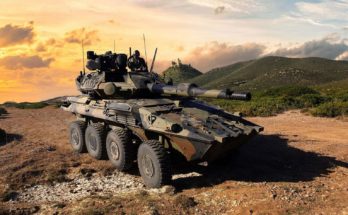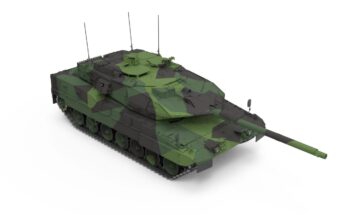
The U.S. Marine Corps has determined that its new Amphibious Combat Vehicle Increment 1.1 meets all desired ship-to-shore swim capabilities, even those that were not planned to be met until the future Increment 1.2 portion of the program. The service was originally planning for Increment 1.1 to feature only basic swim capabilities, after which Increment 1.2 would integrate a true ship-to-shore capability.
The program’s prime contractor, BAE Systems, built the ACV to outperform the initial Increment 1.1 requirements, and vehicle testing has shown that the new ACV will be able to swim from an amphibious warship to shore without the assistance of a connector. This will allow the Marines to merge the ACV program into a single increment.
The Marines have been testing 16 prototype ACVs. The first low-rate initial production vehicles are scheduled for delivery in May or June of this year. BAE Systems won the ACV competition in June 2018. The vehicles are replacing the legacy Amphibious Assault Vehicles.
Shaun's deep-rooted interest in military equipment continues in his role as a senior defense analyst with a focus on the United States. He played an integral role in the development of Forecast International's U.S. Defense Budget Forecast, an interactive online product that tracks Pentagon acquisition programs throughout the congressional budget process. As editor of International Military Markets – North America, Shaun has cultivated a deep understanding of the vast defense markets in the United States and Canada. He is a regular contributor to Forecast International's Defense & Security Monitor blog and has co-authored white papers on global defense spending and various military programs.
- Shaun McDougall
- Shaun McDougall
- Shaun McDougall
- Shaun McDougall
- Shaun McDougall
- Shaun McDougall
- Shaun McDougall
- Shaun McDougall
- Shaun McDougall
- Shaun McDougall
- Shaun McDougall
- Shaun McDougall
- Shaun McDougall
- Shaun McDougall
- Shaun McDougall
- Shaun McDougall
- Shaun McDougall
- Shaun McDougall
- Shaun McDougall
- Shaun McDougall
- Shaun McDougall
- Shaun McDougall
- Shaun McDougall
- Shaun McDougall
- Shaun McDougall
- Shaun McDougall
- Shaun McDougall
- Shaun McDougall
- Shaun McDougall
- Shaun McDougall
- Shaun McDougall
- Shaun McDougall
- Shaun McDougall
- Shaun McDougall
- Shaun McDougall
- Shaun McDougall
- Shaun McDougall
- Shaun McDougall
- Shaun McDougall
- Shaun McDougall
- Shaun McDougall
- Shaun McDougall
- Shaun McDougall
- Shaun McDougall
- Shaun McDougall
- Shaun McDougall
- Shaun McDougall
- Shaun McDougall
- Shaun McDougall
- Shaun McDougall
- Shaun McDougall
- Shaun McDougall
- Shaun McDougall
- Shaun McDougall
- Shaun McDougall
- Shaun McDougall
- Shaun McDougall
- Shaun McDougall
- Shaun McDougall
- Shaun McDougall
- Shaun McDougall
- Shaun McDougall
- Shaun McDougall
- Shaun McDougall
- Shaun McDougall
- Shaun McDougall
- Shaun McDougall
- Shaun McDougall
- Shaun McDougall
- Shaun McDougall
- Shaun McDougall
- Shaun McDougall
- Shaun McDougall
- Shaun McDougall
- Shaun McDougall
- Shaun McDougall
- Shaun McDougall
- Shaun McDougall
- Shaun McDougall
- Shaun McDougall
- Shaun McDougall
- Shaun McDougall
- Shaun McDougall
- Shaun McDougall
- Shaun McDougall
- Shaun McDougall
- Shaun McDougall
- Shaun McDougall
- Shaun McDougall
- Shaun McDougall
- Shaun McDougall
- Shaun McDougall
- Shaun McDougall
- Shaun McDougall
- Shaun McDougall
- Shaun McDougall
- Shaun McDougall
- Shaun McDougall
- Shaun McDougall
- Shaun McDougall
- Shaun McDougall
- Shaun McDougall
- Shaun McDougall
- Shaun McDougall




